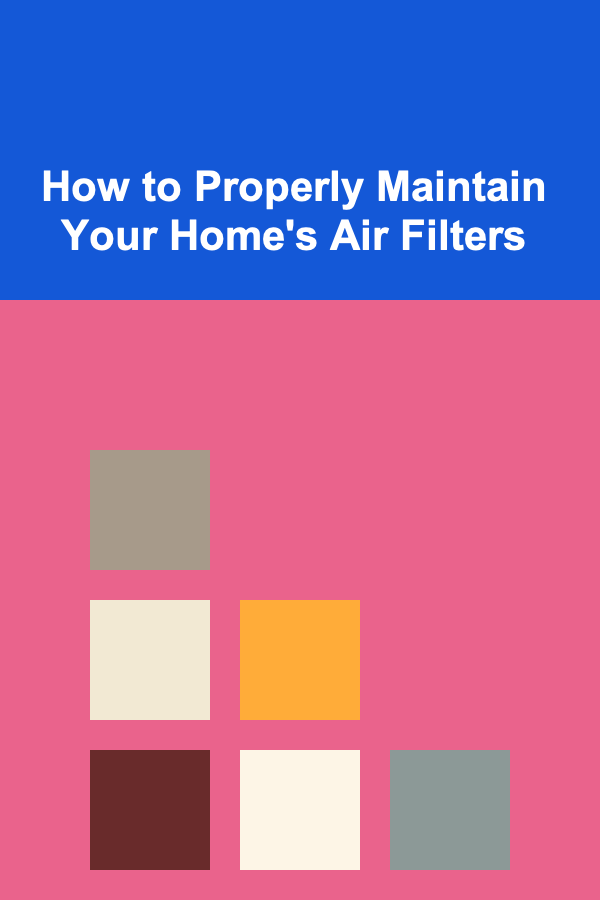
How to Properly Maintain Your Home's Air Filters
ebook include PDF & Audio bundle (Micro Guide)
$12.99$8.99
Limited Time Offer! Order within the next:

Air filters play a crucial role in maintaining indoor air quality and enhancing the performance of HVAC systems in homes. They trap dust, pollen, pet dander, bacteria, mold spores, and other airborne particles, preventing them from circulating throughout your home. Regular maintenance of air filters is essential to ensure that they continue to work effectively, protect your HVAC system, and improve the overall health and comfort of your home.
This comprehensive guide will explore the importance of air filters, how to maintain them properly, and the impact of well-maintained filters on your home's air quality and HVAC system. Whether you're using a simple fiberglass filter or a more advanced HEPA (High-Efficiency Particulate Air) filter, knowing how to care for them can lead to energy savings, a longer-lasting HVAC system, and better indoor air quality.
Understanding Air Filters and Their Role in Indoor Air Quality
Air filters are designed to remove airborne pollutants and allergens from the air that circulates through your HVAC system. They are typically installed in the return air ducts of heating, ventilation, and air conditioning (HVAC) units. When the HVAC system operates, air is drawn through the filter, which captures harmful particles before they enter the air supply that circulates throughout the house.
Types of Air Filters
There are various types of air filters available on the market. The choice of filter depends on several factors such as the desired filtration efficiency, the size of the HVAC system, and specific air quality concerns.
-
Fiberglass Filters
- Description: Fiberglass filters are the most basic and affordable type of air filters. They consist of a mesh made of fine glass fibers and are usually pleated to increase the surface area for filtration.
- Efficiency: These filters capture larger particles like dust and dirt but are less effective at trapping smaller particles such as pollen or pet dander.
- Usage: Ideal for general, low-maintenance homes without serious air quality issues.
-
Pleated Filters
- Description: Pleated filters have a larger surface area due to their folded design, which allows them to trap more particles.
- Efficiency: Pleated filters are more effective than fiberglass filters and can capture smaller particles like mold spores and pollen.
- Usage: Suitable for homes with moderate air quality concerns.
-
HEPA Filters
- Description: High-Efficiency Particulate Air (HEPA) filters are made from dense layers of fibers and are capable of trapping tiny particles as small as 0.3 microns.
- Efficiency: HEPA filters are the most effective at capturing airborne particles, including dust mites, pet dander, pollen, smoke, and bacteria.
- Usage: Ideal for homes with specific air quality issues or for individuals with respiratory conditions like asthma or allergies.
-
Activated Carbon Filters
- Description: Activated carbon filters are designed to remove gases, odors, and chemicals from the air. They are often used in conjunction with other filters for better air purification.
- Efficiency: These filters are effective at removing odors, volatile organic compounds (VOCs), and smoke.
- Usage: Best for homes in areas with high pollution levels or homes with smokers.
-
Electrostatic Filters
- Description: Electrostatic filters use static electricity to attract and capture particles from the air.
- Efficiency: These filters can capture both small and large particles and are reusable after cleaning.
- Usage: Suitable for those looking for a cost-effective, reusable filter.
-
UV Filters
- Description: Ultraviolet (UV) filters use UV light to kill bacteria, viruses, and mold spores that pass through the filter.
- Efficiency: UV filters are especially effective for homes dealing with mold or bacteria problems.
- Usage: Commonly used in areas with high humidity or mold growth issues.
Each type of filter has its advantages and limitations, and selecting the right filter depends on your home's needs, the level of air quality desired, and your HVAC system's compatibility.
The Importance of Regular Maintenance
Proper maintenance of air filters is essential for ensuring the optimal performance of your HVAC system and improving indoor air quality. Dirty or clogged filters can reduce the efficiency of your HVAC system, lead to increased energy consumption, and potentially damage the system. Below are the key reasons to maintain your air filters properly:
1. Improved Air Quality
Air filters trap pollutants and allergens, improving indoor air quality. Over time, filters collect debris and become clogged, reducing their effectiveness. Regular cleaning or replacing filters ensures that the air circulating through your home remains clean and free from harmful particles, which is especially important for individuals with asthma, allergies, or other respiratory conditions.
2. Energy Efficiency
A clogged filter forces your HVAC system to work harder to circulate air, which can lead to higher energy consumption and increased utility bills. When filters are clean and functioning properly, air flows more easily, allowing your system to operate more efficiently and reduce energy consumption.
3. Extended HVAC Lifespan
By preventing the accumulation of dirt and debris in the system, clean air filters help reduce strain on the HVAC unit, extending its lifespan. A clean filter ensures that air flows freely, minimizing wear and tear on the system and preventing components from overheating.
4. Fewer Repairs
Regularly maintaining your air filters helps prevent costly repairs. Dirty filters can cause the system to overheat, freeze, or develop other issues that may require professional intervention. Proper maintenance can avoid such problems and keep your HVAC system running smoothly.
5. Improved Comfort
When air filters are clean, your HVAC system can maintain a consistent temperature and humidity level throughout the home. A properly maintained system enhances comfort by preventing hot or cold spots, ensuring that the air quality is just right.
How to Maintain Your Air Filters
Maintaining your air filters is a simple task, but it requires consistency and attention to detail. Here are some essential steps for proper air filter maintenance:
1. Check Filters Regularly
It's important to inspect your air filters every month, particularly if you live in an area with high dust levels, pets, or allergies. Filters can become clogged much faster in these environments. If the filter appears dirty or clogged, it's time to clean or replace it.
- Fiberglass and pleated filters typically need to be replaced every 1 to 3 months.
- HEPA filters can last 6 months to a year, depending on the level of use and air quality concerns.
- Reusable filters (e.g., electrostatic filters) should be cleaned regularly, typically every 1 to 3 months.
2. Replace Filters as Needed
Depending on the type of filter and how often you use your HVAC system, filters will eventually need to be replaced. The manufacturer's recommendations will guide you on how frequently to change your filter. For example:
- Standard Fiberglass Filters: Replace every 30-60 days.
- Pleated Filters: Replace every 90 days (or sooner if heavily used).
- HEPA Filters: Replace once a year or as advised.
- Activated Carbon Filters: Replace every 3 to 6 months for optimal performance.
Changing filters regularly ensures that your HVAC system functions at its best and helps to maintain air quality in your home.
3. Clean Reusable Filters
If you have a reusable electrostatic filter, it should be cleaned regularly to remove the particles it collects. Follow these steps:
- Turn off the HVAC system before removing the filter.
- Rinse the filter with warm water to remove dust and debris. Some filters can be washed with mild soap if they are particularly dirty.
- Dry the filter thoroughly before reinserting it into the HVAC system to prevent mold or mildew growth.
It's important not to use harsh chemicals or scrub the filter too hard, as this could damage the material.
4. Vacuum or Wash Filter Grills
While you're cleaning or replacing your air filters, it's also a good idea to clean the filter grills. Dust and debris can accumulate around the filter and impact airflow. Vacuuming or wiping down the grills will ensure that the air is flowing freely and that the HVAC system operates efficiently.
5. Inspect for Damage
While replacing or cleaning your filters, take the time to inspect them for any signs of damage, such as tears or warping. Damaged filters may not function properly and could allow air and particles to bypass the filter entirely, which would undermine the purpose of the filter. If you notice any damage, replace the filter immediately.
6. Monitor Air Quality and HVAC Performance
Even after maintaining your filters, continue to monitor air quality and the performance of your HVAC system. If you notice any unusual smells, increased dust, or inconsistent heating or cooling, your air filters may still need attention. Keeping an eye on these factors will help you catch potential issues early.
Common Mistakes to Avoid
Proper air filter maintenance is essential for optimal HVAC performance and air quality. However, there are some common mistakes people often make when it comes to air filter care. Here's a list of mistakes to avoid:
1. Ignoring Filter Changes
Many homeowners forget to replace their air filters on schedule. This leads to clogged filters, reduced air quality, and increased strain on the HVAC system. Setting a reminder or creating a maintenance schedule can help avoid this mistake.
2. Choosing the Wrong Filter
Not all filters are created equal. Choosing a filter that doesn't suit your home's needs or HVAC system can result in inefficient filtration and reduced air quality. Be sure to select the right type of filter based on your needs and follow the manufacturer's specifications.
3. Using the Wrong Size Filter
Using a filter that is the wrong size for your HVAC system is a serious mistake. A filter that's too small or too large won't fit properly, allowing air to bypass the filter and reducing its effectiveness. Always check the size specifications before purchasing or replacing filters.
4. Overlooking Other Maintenance Tasks
Air filters are just one part of HVAC maintenance. Don't neglect other essential tasks such as cleaning the condenser coils, ensuring proper airflow, and scheduling regular professional HVAC inspections. Comprehensive maintenance will help keep your system in top condition.
5. Using Dirty or Damaged Filters
Using a filter that's damaged or excessively dirty can cause serious problems for your HVAC system. Always replace filters that are past their prime to ensure the continued efficiency of your heating and cooling system.
Conclusion
Maintaining your home's air filters is a simple but vital task that directly impacts air quality, HVAC efficiency, and comfort. By regularly checking, cleaning, or replacing your filters, you can ensure that your home stays healthy and your HVAC system remains efficient. Don't overlook the importance of proper filter maintenance, as it contributes to a cleaner environment, lower energy bills, and the long-term health of your HVAC system. With consistent care, you can enjoy better air quality, improved energy efficiency, and a more comfortable home environment.
Reading More From Our Other Websites
- [Soap Making Tip 101] The Sensitive Skin Soap‑Maker's Guide: Ingredients to Embrace and Avoid
- [Survival Kit 101] Survival Kit Checklist for Beginners: A Simple Guide to Getting Prepared
- [Home Family Activity 101] How to Make Family Time More Special with Themed Dinner Nights
- [Home Party Planning 101] How to Serve Food Buffet-Style for a Relaxed Home Party
- [Survival Kit 101] How to Develop a Family‑Focused Survival Kit for Multi‑Generational Households
- [Home Soundproofing 101] How to Soundproof Your Home With Minimal Disruption
- [Trail Running Tip 101] 5 Hill‑Boost Intervals to Power Up Your Trail Runs
- [Screen Printing Tip 101] How Screen Printing Can Boost Your Small Business Brand Visibility
- [Weaving Tip 101] Designing a Space-Saving Weaving Studio: Layout Tips for Small Rooms
- [Organization Tip 101] How to Make Freezer-Friendly Soups and Stews

How to Handle Renters Who Violate Property Rules
Read More
How to Keep Your Home's Plumbing in Top Condition
Read More
How to Write Down Hopes and Dreams for the Future
Read More
How to Discuss a Movie's Stunt Work
Read More
Conflict Resolution for Couples: Turning Disagreements into Growth
Read More
How to Track Childcare Expenses for Tax Deductions
Read MoreOther Products

How to Handle Renters Who Violate Property Rules
Read More
How to Keep Your Home's Plumbing in Top Condition
Read More
How to Write Down Hopes and Dreams for the Future
Read More
How to Discuss a Movie's Stunt Work
Read More
Conflict Resolution for Couples: Turning Disagreements into Growth
Read More